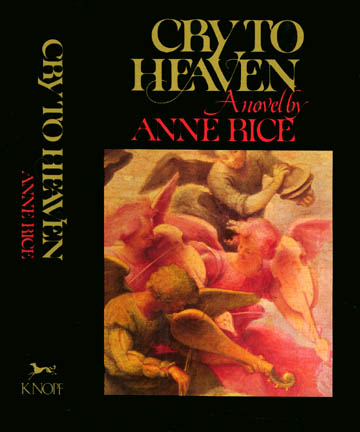Wisely, Anne Rice uses this prevailing apprehension to her advantage. At the beginning, we can readily empathize with Tonio's plight and struggles because he has not yet been transformed into society's largest fear: the androgynous figure. Comfortably, we feel kinship with him because he has set, definitive gender roles. This male archetype allows Anne Rice for us to nestle safely within the story before being confronted with his literary "fall from grace." Mary Shelley's Frankenstein works similarly when we are greeted with Dr. Frankenstein, in that story, before he deviously invents an aberration of humanity.
Due to Christian ethos, gender expression is something that we wrongly believe to be static. According to that ethos, male and females should work adversely against their spiritual selves and mindlessly conform to some accepted archetype. Individuals that deviate from these comfortable archetypes are ill-treated and feared. Frankenstein worked more metaphorically in that he represented the outsider of society that hardly any humans can seek to empathize with. Our compromised morals often cloud our consciences from forming instinctive desires for true morality where we genuinely feel compassion for our fellow human: we feel a sincere bond of kinship for a person's spiritual worth.
In Anne Rice's literary world of eunuchs, music serves as the spiritual catharsis for the bereaved eunuchs who are not accepted by their culture. Within this music, they are imbued with a sense of passion and purpose within a world that has sought to debase them. Their angelic voices are the manifestation of intrinsic worth and beauty: it is the formerly suppressed spiritual self that is desirous of recognition.
Often in our world, our religion is soulless. Instead of being pervaded with a sense of appreciation for the diverse beauty of our selves, we are instructed to abhor the most deplorable parts. For an institution to gain power, there always has to be a stigmatized, scapegoated minority. Without that, the institution then cannot salvage their reputation by diverting people's attention from their own sin. There has to be a condemned, heretical group that will serve as the model of being biologically unfit for God's acceptance. With relation to Calvinistic principles, the people who are biologically suited for the religious life will thus earn acclaim and a higher place within the invented hierarchy. In this earthbound scheme of heaven and hell, it is not a rift between the sinful and the sinless. Reversely, it is the segregation between normality and abnormality, theist and atheist, and men and women.
Anne Rice's "Cry to Heaven," book is an immense book that expresses different messages for different people. For the musically or artistically inclined, it offers a message of acceptance for those people who often feel overlooked or misunderstood for their radical imaginations. In another sense, the book acts as an exploration of that largely ignored population in our world that fits neither the societal gender role of male and female. Yet, the book shows that their only means of attaining acceptance comes through having some profitable utility. It also shows that this utility characterizes the eunuchs as being both human and spiritual creatures. Therefore, they are not so different from those who comfortably blend within the female and male world.
This book is evocative and richly textured. Reading it will take a long length of time to fully appreciate and process the implications and purpose of the story. Like many of Anne Rice's other books, it can often feel excessively rich at points due to a few instances where the description dominates the story and character development. But, this problem is often alleviated quickly when Anne Rice rectifies this with wonderful sequences where the character, plot, and poetic descriptions work jointly to create an addictive, purposeful reading experience. After reading this book, you will certainly be dreaming long after of all the sumptuous images and complex details of this splendid story.











2 comments:
Excellent review of Cry to Heaven. I read it a few years ago and truly enjoyed it.
Incredible review Justin!
Post a Comment